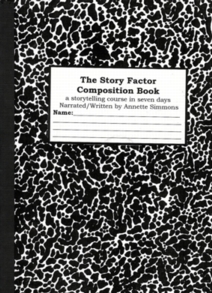
In an earlier entry, I described the presentation by storytelling author and expert Annette Simmons at a storytelling conference in Washington, DC, in April. I mentioned how Annette had pulled an Oprah-like act of generosity and given each audience member a copy of The Story Factor Composition Book (pictured) and the accompanying CD with a sample of the first two lessons that go with the composition book.
I finally had a chance to listen to the CD, and it was a delight to again listen to Annette’s Carolina twang. I’ve reviewed several audio products in my work for QuintCareers, and they are usually quite didactic and lecture-y. Annette’s is, conversely, completely conversational. The first two segments are about 20 minutes each, which seems like about the right length, and they are full of illustrative stories. I have to say that in all the research I’ve done about storytelling in the last year, proponents talk a lot about the value of story, but there seems to be a dearth of examples of actual stories. Not the case with Annette’s CD, which also offers some old-timey, twangy musical interludes that sound exactly like what you’d hear sitting around the campfire listening to stories.
I’m struck by a couple of things about Annette’s composition book and CD combo. First, I thought about the “Telling Stories” seminar I recently attended for my PhD program and how Annette’s approach would probably have worked in the seminar. Which is not to say that the approach of the seminar conveners wasn’t great. The seminar was excellent, but Annette’s framework would have been extremely useful as well. At the seminar, the focus was on writing, but there’s only a slim nuance of difference between that focus and Annette’s emphasis on story composition and storytelling.
The other thing is about the applicability of Annette’s 7-day course to job-seeking and career. Anyone who is actually reading this blog knows that, while I am interested in many aspects of story, I am especially interested in how storytelling can be used in organizational entry, i.e., getting jobs. Annette’s course would be fantastic in a career workshop because so many of the stories she talks about can be used in the job search. Sure, some types of stories are more useful in the job search than others. Her “Who Am I?” “Why I’m Here?” and “Vision” stories are particularly relevant, but all her story types have SOME application to job-seeking and career development. That was evident to me when I read her book, The Story Factor, but it’s especially evident in sampling this course.
Annette’s approach is even applicable to networking. One of the first points she makes is that storytelling is reciprocal; the same is true of networking. To be an effective networker, you have to give as much as you get. Similarly, Annette says that you have to be a good story listener to be a good storyteller.
While it may seem far-fetched to apply Annette’s definition of story to resumes, cover letters, job interviews, and career portfolios (well, maybe not so far-fetched with interviews), I am convinced this definition could breathe new life into the job-hunting scene:
“Story is a re-imagined experience narrated with enough detail and feeling to cause your listeners’ imaginations to experience the event through their imagination.”
Think of it — if an employer can imagine your performing for his or her company based on the vibrant story you tell of what you can do, you will be that much closer to landing a job.
As you can tell, I am very high on Annette Simmons’s work, and I’m sure the full CD and composition book will be a big hit when they are released in the fall of 2005.
